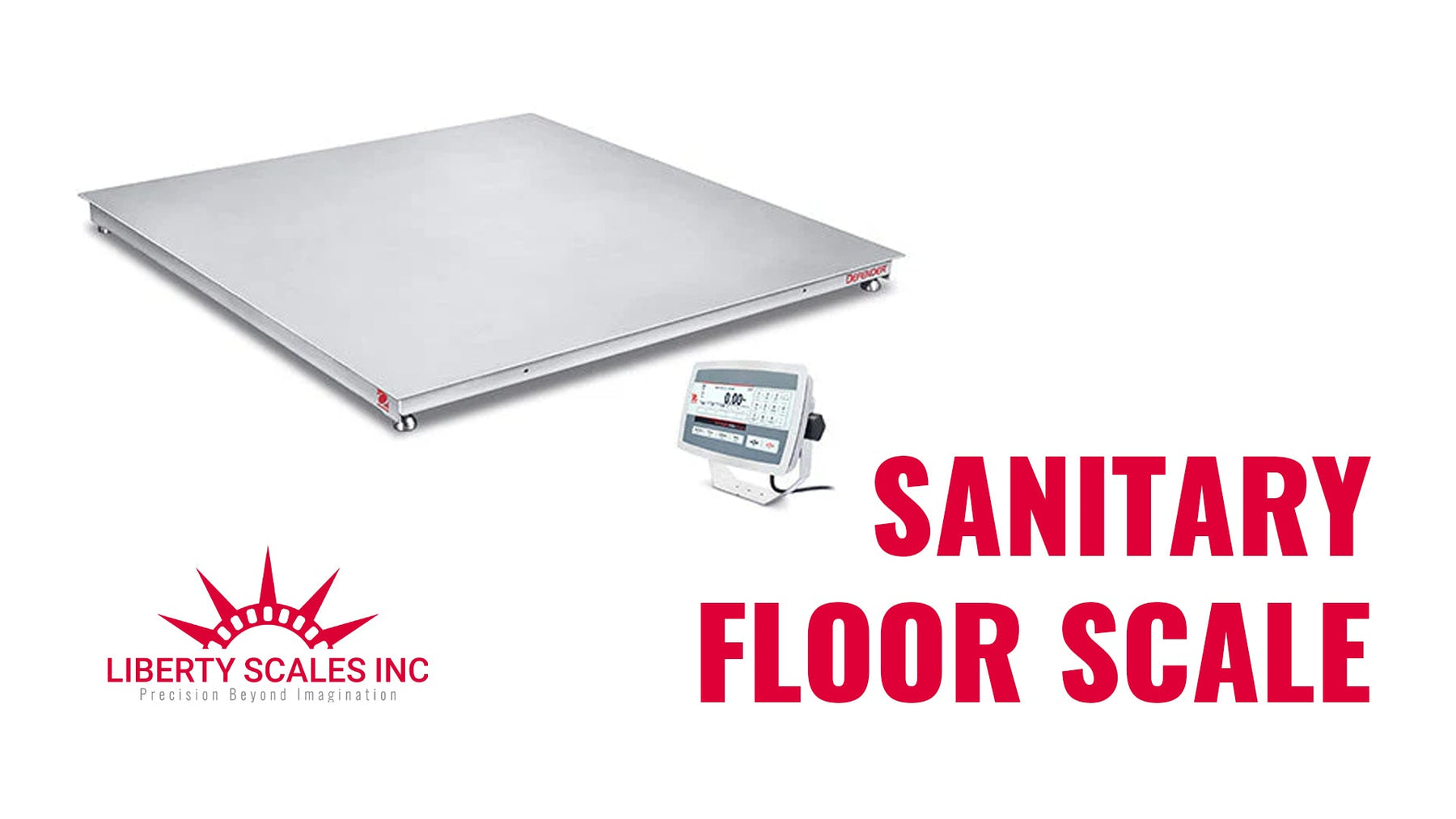
Sanitary Floor Scale | Precision & Hygiene for Industrial Needs
If you work in industries like food processing or pharmaceuticals, you know how crucial hygiene is. That’s where the sanitary floor scale comes in. It helps prevent contamination and ensures accurate measurements. In this article, we’ll look at why these scales are essential, what features to look for, and how they benefit your operations.
Key Takeaways
-
Sanitary floor scales are essential for maintaining hygiene in industries such as food processing and health, preventing contamination and ensuring compliance with health regulations.
-
Features of sanitary floor scales, including stainless steel construction and water resistance, enhance durability, ease of cleaning, and overall operational efficiency.
-
Regular cleaning and a maintenance schedule are crucial for the longevity and accuracy of sanitary floor scales, helping to prevent measurement errors and ensuring compliance with industry standards.
Importance of Hygienic Weighing Equipment
Hygiene in weighing equipment is not just a regulatory requirement but a cornerstone of operational excellence. Sanitary floor scales must adhere to specific health regulations, including:
-
Cleanliness
-
Maintenance
-
Prevention of contamination In industries such as food processing and health, hygiene practices are vital to avoid contamination and ensure safety.
Maintaining proper hygiene in weighing equipment reduces the risk of foodborne illness and boosts overall operational efficiency. Adhering to hygiene protocols helps businesses comply with regulations and builds trust in their products and brand within the industry. A commitment to cleanliness and safety reflects a company’s dedication to quality.
In hygiene-critical environments like food and health industries, sanitary floor scales play an essential role. Ensuring weighing equipment is clean and free from contaminants helps businesses protect public health and maintain high standards.
Features of Sanitary Floor Scales
Sanitary floor scales are designed with specific materials and features to meet the high standards of cleanliness required in industrial settings. Materials like stainless steel prevent corrosion and simplify sanitation. Industries prioritizing hygiene, such as food and pharmaceuticals, benefit from stainless steel construction.
Models with stainless steel construction ensure durability and compliance with sanitation standards. These designs facilitate efficient cleaning and maintenance, enhancing operational efficiency.
Designed to endure frequent cleaning and harsh chemicals, heavy duty sanitary floor scales suit various industrial environments. Many of these scales are built to endure high-pressure washing, featuring IP69K ratings for water resistance. Such features keep the scales hygienic and functional under demanding conditions.
Incorporating these features into sanitary floor scales not only ensures compliance with health regulations but also extends the lifespan of the equipment, making them a valuable investment for any industry that prioritizes hygiene, durability, and year-long performance.
Benefits of Using Sanitary Floor Scales
The benefits of using sanitary floor scales extend far beyond mere compliance with health regulations. Maintaining cleanliness in the production process is crucial for food manufacturers to prevent foodborne illnesses. Sanitary floor scales ensure weighing equipment remains clean and contaminant-free.
In the food industry, accurate ingredient measurement is vital to meet regulatory standards and ensure product quality. These scales provide precise measurements, which are essential for maintaining product consistency and quality in food production. Using hygienic weighing equipment enhances food safety and operational efficiency.
Sanitary floor scales also boost operational efficiency by minimizing maintenance thanks to their robust construction. The durable materials used in these scales can withstand harsh conditions without degrading, ensuring longevity and reducing the need for frequent replacements. Durability leads to cost savings and uninterrupted operations.
Best Practices for Maintaining Hygienic Weighing Equipment
Maintaining hygienic weighing equipment involves regular cleaning and a well-structured maintenance routine. Sanitary floor scales are designed for easy access to all areas, allowing thorough cleaning. Some models even incorporate removable components to enhance cleaning efficiency and hygiene.
A regular cleaning routine helps prevent corrosion and contamination on floor scales. Regular cleaning prevents measurement errors from accumulated debris. Recommended practices include:
-
Using soft brushes or compressed air for cleaning hard-to-reach areas
-
Proper waste disposal
-
Vermin control These are critical components of health regulations affecting the operation of sanitary floor scales.
A scheduled maintenance plan:
-
Prevents unexpected breakdowns and extends the scale’s life by addressing wear and tear early.
-
Detects early signs of problems like fluctuating weight displays to prevent larger issues and reduce maintenance costs.
-
Includes periodic inspections for damage or wear, such as cracks or corrosion, to ensure optimal performance.
Selecting the Right Sanitary Floor Scale for Your Needs
Choosing the right sanitary floor scale involves considering several factors to meet specific operational needs. Weight capacity is critical, with some floor scales accommodating loads over 20,000 lbs. Knowing the weight limits prevents damage and inaccurate measurements.
U-scales are ideal for operations using pallets and pallet jacks frequently, as they facilitate easy loading. When space is limited, compact models like U-scales ensure efficient use of the area. Simple floor scale ramps, available in various sizes, facilitate easy access and improve functionality for trucks.
Key aspects related to floor scales include:
-
Bumper guards protect floor scales from accidental damage during loading and unloading.
-
Portable pit frames provide versatile installation options, adding value to any industrial setup.
-
Documenting maintenance activities helps track the performance and reliability of floor scales over time.
How to Operate Sanitary Floor Scales Efficiently
Efficient operation starts with:
-
Regular calibration checks using known weights to maintain accuracy.
-
Calibrating after repairs or adjustments to ensure long-term accuracy.
-
Having professionals handle calibration to avoid potential accuracy issues.
Training staff in safe practices reduces workplace injuries and ensures the equipment’s longevity. Proper training enables workers to learn to operate the scales efficiently and accurately, enhancing operational power in their job.
Accessories to Enhance Your Sanitary Floor Scales
Accessories significantly enhance the functionality and hygiene of sanitary electronic floor scales. Wireless connectivity options like Wi-Fi and USB enhance data transfer capabilities, making it easier to store and analyze weight data. Protective covers keep floor scales clean and contaminant-free when not in use.
These accessories improve efficiency and maintain hygiene standards in industrial operations. You can find port pit frames and bumper guards that protect scales from damage and extend their lifespan, making them a perfect investment.
Real-World Applications of Sanitary Floor Scales
Food processing facilities extensively use sanitary floor scales to ensure hygiene standards while weighing ingredients and products. Operating effectively in wet or washdown environments, these scales suit various food industry applications.
Agricultural operations use sanitary floor scales and industrial scales to monitor livestock and bulk product weights for better resource management. In chemical manufacturing, these scales accurately measure hazardous materials while maintaining safety and cleanliness.
Warehouses use sanitary floor scales to track shipping weights, enhancing inventory accuracy and operational efficiency. These applications highlight the versatility and necessity of sanitary floor scales across a variety of place industries.
Ensuring Compliance with Health Regulations
Using sanitary floor scales that meet industry standards ensures compliance with health regulations. Liberty Scales’ products meet health compliance standards, ensuring safety in sanitary environments.
The National Type Evaluation Program (NTEP) tests and certifies weighing equipment to ensure it meets regulatory standards. Assessing the environmental conditions, like moisture or corrosive material exposure, is crucial to determine compliance and safety.
Common Mistakes to Avoid with Sanitary Floor Scales
Regular maintenance is crucial for accurate measurements and prolonging the equipment’s reliable lifespan. A maintenance schedule and documented activities prevent common operational errors.
Avoiding maintenance mistakes ensures compliance with health regulations and enhances operational efficiency. Documenting maintenance activities and calibration checks tracks the scale’s performance and prevents potential issues.
Summary
Sanitary floor scales are indispensable tools in industrial settings where precision and hygiene are crucial. By adhering to best practices for maintenance and selecting the right scale for specific needs, businesses can enhance operational efficiency and ensure compliance with health regulations. Incorporating accessories and training staff in proper usage further maximizes the benefits of these scales.
In conclusion, investing in high-quality sanitary floor scales and committing to regular maintenance not only safeguards public health but also builds trust and enhances the reputation of your business. Embrace these practices to achieve excellence in your industrial operations.
Frequently Asked Questions
What are the 5 C's of food safety?
The 5 C's of food safety are Cleaning, Cooking, Chilling, Cross-Contamination Prevention, and Communication. Adhering to these principles ensures the safety and quality of food prepared and consumed.
Why is it important to maintain hygiene in weighing equipment?
It is essential to maintain hygiene in weighing equipment to prevent contamination and ensure safety, particularly in industries such as food processing and healthcare. Compliance with health regulations also underscores the importance of this practice.
What materials are commonly used in sanitary floor scales?
Stainless steel is the predominant material used in sanitary floor scales, due to its corrosion resistance and ease of sanitation. This ensures both durability and hygiene in various environments.
How can I ensure accurate measurements with my floor scale?
To ensure accurate measurements with your floor scale, conduct regular calibration checks using known weights and consider utilizing professional calibration services as needed. Consistent maintenance will help maintain the scale's precision.
What are some accessories that can enhance the functionality of my floor scale?
Utilizing accessories such as wireless connectivity options, protective covers, portable pit frames, and bumper guards can significantly enhance the functionality and hygiene of your floor scale. These additions ensure improved usability and longevity.
